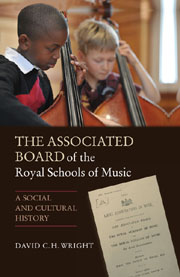Book contents
- Frontmatter
- Contents
- List of Illustrations
- List of Tables
- Dedication
- Preface
- List of Abbreviations
- Miscellaneous Conventions
- Introduction: The Context for a History
- I THE BACKGROUND
- II THE BOARD ESTABLISHED, 1889–1920
- III THE INSTITUTIONAL CULTURE, 1920–83
- IV THE BOARD REVIVED, 1983–2009
- Appendix 1 Speech and Drama Examinations
- Appendix 2 ABRSM Personalia, 1889–2010
- Select Bibliography
- Index
Appendix 1 - Speech and Drama Examinations
Published online by Cambridge University Press: 05 July 2013
- Frontmatter
- Contents
- List of Illustrations
- List of Tables
- Dedication
- Preface
- List of Abbreviations
- Miscellaneous Conventions
- Introduction: The Context for a History
- I THE BACKGROUND
- II THE BOARD ESTABLISHED, 1889–1920
- III THE INSTITUTIONAL CULTURE, 1920–83
- IV THE BOARD REVIVED, 1983–2009
- Appendix 1 Speech and Drama Examinations
- Appendix 2 ABRSM Personalia, 1889–2010
- Select Bibliography
- Index
Summary
IN 1922 the ABRSM began to offer Elocution exams in the UK. (The Elocution exams were called ‘Grades’ in order to distinguish them from the Local Centre and Local School Exams in music; in 1933 ‘Grade’ was the term adopted to distinguish the individual steps of the newly restructured music exams.) There were five Elocution grades, and, as in the case of the earliest music exams, candidates had first to pass a Qualifying Examination before they could take the Elocution exam itself. The Qualifying Examination required knowledge of musical notation, and its four tests were Pitch, Rhythm without Words, Rhythm with Words and Reciting to Music, clearly chosen to emphasize the complementarity of the disciplines of music and speech. The entry fee for the highest or Fifth Grade was £1 11s 6d (some £63.70 in today's RPI value), which made it an expensive exam. The candidate was required to give three recitations chosen from a prescribed list, to read at sight a poem and a prose extract, and to answer questions ‘on the interpretation and significance of Selections, and general technique’. In the first complete year, although 226 candidates took the Qualifying Examination, only 134 proceeded to the Elocution exam, which suggests that the standards at the preliminary stage were set high. The Qualifying Examination was abandoned in 1926 and replaced with a written exam.
- Type
- Chapter
- Information
- The Associated Board of the Royal Schools of MusicA Social and Cultural History, pp. 257 - 258Publisher: Boydell & BrewerPrint publication year: 2013



